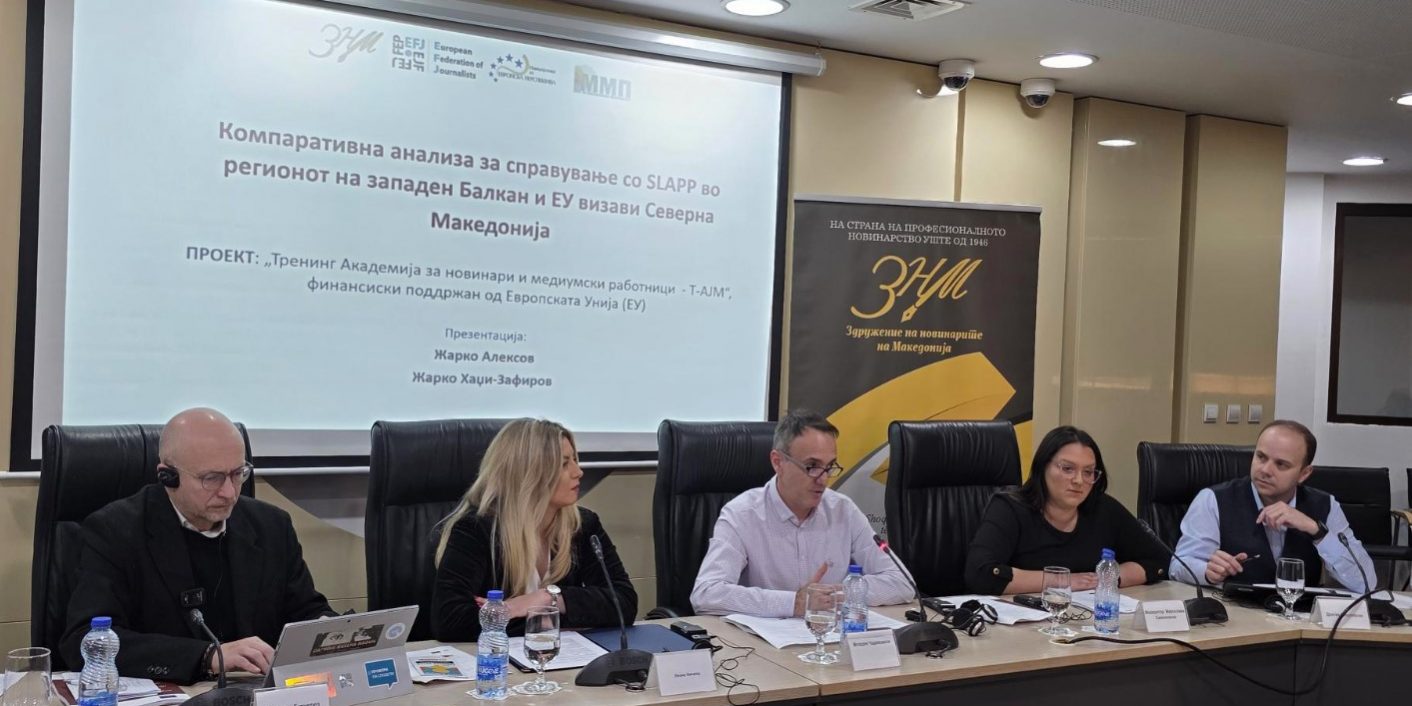As part of the 2025 Media Literacy Days, an event dedicated to strengthening the media community’s resilience to legal pressures on journalists—focusing on Strategic Lawsuits against Public Participation (SLAPP)—was held on 20 November at the premises of the Agency for Audio and Audiovisual Media Services (AVMU).
The central part of the event featured the presentation of the Comparative Analysis on SLAPP Responses in the EU Member States and the Western Balkans Compared to the Republic of North Macedonia, authored by Zharko Aleksov and Zharko Hadzi-Zafirov. The Analysis highlights significant gaps in national legislation and judicial practice—ranging from the lack of clear procedural mechanisms for early dismissal of abusive lawsuits to insufficient safeguards protecting journalists from financial and psychological pressure. The authors recommended a set of legislative and institutional measures aimed at enabling faster court responses and better prevention of SLAPP cases.
The event, titled “Building Resilience: T-AJM Academy for Journalists – How to Address SLAPP Lawsuits”, was opened by the President of the Association of Journalists of Macedonia (AJM), Mladen Chadikovski, who emphasized that the fights against SLAPP was a crucial part of the efforts to improve journalists’ safety and independence. In her opening remarks, Ministry of Justice representative Leona Kicheec underscored the importance of the SLAPP issue and highlighted the Ministry’s readiness for dialogue with the media community and the expert public regarding future reforms.
Dragan Sekulovski, Executive Director of AJM, also addressed the state of play and trends related to SLAPP lawsuits, noting that the number of cases with SLAPP elements was rising and that the pressures often originate from powerful political and economic actors. He stressed that the comparative analysis should serve as a practical roadmap for reform—from alignment with the European standards and the new SLAPP Directive, to amendments to the national laws, improvements in judicial practice, and the establishment of mechanisms for legal and psychological support for journalists. Sekulovski underlined that without a systemic approach and coordinated action among institutions, media organizations, and international partners, SLAPP would continue to undermine freedom of expression.
Ricardo Gutiérrez, Secretary General of the European Federation of Journalists (EFJ), spoke about the European trends and measures taken by EU institutions, emphasizing that solidarity and coordinated approaches among journalists’ organizations were essential. He pointed out that the activities of AJM’s Training Academy significantly contribute to strengthening the capacity of journalists and media workers to respond to SLAPP.
The conclusion drawn at the event was that reducing and preventing SLAPP lawsuits requires sustained inter-institutional cooperation, substantive legislative improvements, and practical support mechanisms for journalists facing legal pressure. The media community, together with civil society and state institutions, must work toward building a more resilient society in which critical thinking is protected and the media can fulfil their democratic role freely.
AJM remains committed to supporting journalists and promoting policies that guarantee freedom of expression and a safe media environment for all media workers.
This publication was produced as part of the project titled “Training – Academy for Journalists and Media Workers, T-AJM”, funded by the European Union (EU) and implemented by the Association of Journalists of Macedonia (AJM), in partnership with the European Perspective Initiative (EPI) and the European Federation of Journalists (EFJ).






